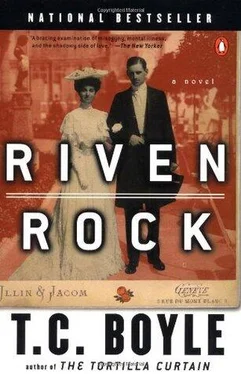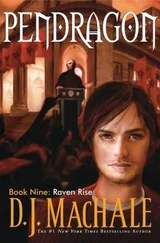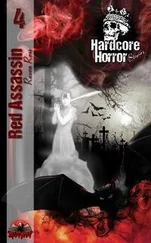T. Boyle - Riven Rock
Здесь есть возможность читать онлайн «T. Boyle - Riven Rock» весь текст электронной книги совершенно бесплатно (целиком полную версию без сокращений). В некоторых случаях можно слушать аудио, скачать через торрент в формате fb2 и присутствует краткое содержание. Год выпуска: 1999, Издательство: Penguin Books, Жанр: Современная проза, на английском языке. Описание произведения, (предисловие) а так же отзывы посетителей доступны на портале библиотеки ЛибКат.
- Название:Riven Rock
- Автор:
- Издательство:Penguin Books
- Жанр:
- Год:1999
- ISBN:нет данных
- Рейтинг книги:5 / 5. Голосов: 1
-
Избранное:Добавить в избранное
- Отзывы:
-
Ваша оценка:
- 100
- 1
- 2
- 3
- 4
- 5
Riven Rock: краткое содержание, описание и аннотация
Предлагаем к чтению аннотацию, описание, краткое содержание или предисловие (зависит от того, что написал сам автор книги «Riven Rock»). Если вы не нашли необходимую информацию о книге — напишите в комментариях, мы постараемся отыскать её.
Riven Rock — читать онлайн бесплатно полную книгу (весь текст) целиком
Ниже представлен текст книги, разбитый по страницам. Система сохранения места последней прочитанной страницы, позволяет с удобством читать онлайн бесплатно книгу «Riven Rock», без необходимости каждый раз заново искать на чём Вы остановились. Поставьте закладку, и сможете в любой момент перейти на страницу, на которой закончили чтение.
Интервал:
Закладка:
When they landed she went straight to her mother‘s — and there was no mention of the house they were planning in Marion, no mention of a life together at all — and Stanley went home to Chicago. To the Harvester Company. To his duties. To his mother. Katherine didn’t get out of bed for a week. She cried till there was no fluid left in her body, her mother and the housemaid plying her all the while with broth, tea and ginger ale. That was the worst. That was the low point — lower even than when she’d broken off the engagement. She was separated from her husband after only six months of marriage, no smiling tall handsome figure of a man to show off at the theater, parties and teas, Abigail Slaney with three adorable children already and Bessie Dietz with four, her schoolmates all grown matronly and plump in their adventitious fecundity and she a withered root, a failure. A failure, after all.
And then the telegrams started arriving. A blizzard of telegrams, a spring storm. So many that she got to know by face, name and footfall every Western Union delivery boy in the Back Bay, and when she fell off to sleep at night bicycle bells jingled through her dreams. Stanley missed her. He hated his job. He hated the whole enduring concept of reapers, tractors and harvesters. He hated his mother. He wasn’t feeling well. Cyrus was president and Harold was vice president, but Katherine was his wife, his only wife, and he loved her, wanted to fall at her feet and worship her, wanted to quit his job and come to her in Boston and build a house for her in Marion and fill it full of things and live happily. Ever after.
He came in on the train this time, less than two months after they’d parted, and this time it was she who met him at the station, flushed and expectant. And when she saw him there in the crowd, the face of him, the brooding masculine beauty and power, Stanley Robert McCormick, the genius, the artist, the millionaire, she fell in love all over again. He took her in his arms right there on the platform and they embraced for all the world to see, shoe-shine boys and porters and peanut vendors and silly little women in silly little hats, and she didn’t care a whit. She held him, just held him, for what seemed like hours.
Josephine couldn’t disguise her pleasure. And she couldn’t have been prouder and noisier and more excited if Stanley was Teddy Roosevelt himself, returned triumphant from Havana all over again and plopped down in her front parlor. The ensuing month was one fête after another, the Stanley McCormicks toasted and congratulated from one house to the next, bluestocking Boston getting a look at the groom at last. All seemed well, and Stanley seemed to be enjoying himself, his nervous twitches and irritable moods all but evaporated, until one night they attended a dinner party given for them by Hugh and Claudia Dumphries on Beacon Hill and Stanley got it into his head that Butler Ames was among the guests.
They were eighteen at dinner, and Hugh, an old friend of Katherine’s mother and a celebrated landscape artist, stood to propose a toast. He was a fatigued-looking man, skeletally thin, with a gray tonsure and rectangular spectacles that distorted his colorless eyes; his preferred topic of conversation — his sole topic — was art and art history, and Katherine had thought Stanley would find him amusing. “To Katherine and Stanley,” he proposed, lifting his glass at the head of the table.
Stanley was sitting to his immediate right. He’d been complaining all day about dogs and looking glasses, muttering under his breath in the cab on the way over, and Katherine should have seen it as a sign. “I won’t have it,” he said, bolting up from the table as sixteen guests froze in place with their wineglasses stalled in midair.
Hugh looked as puzzled as if the ceiling had cried out in pain or the walls begun to speak. He hunched his thin shoulders and gazed out myopically from the prison of his spectacles. “What?” he said. “What do you mean?”
“Stanley,” Katherine warned, her voice tight in her throat.
Stanley ignored her. He was transformed, huge and threatening, looming over the table like a tree cut and wedged and about to thunder down on them. He pointed a finger at an innocuous-looking young man at the far end of the table whose name Katherine hadn’t quite caught when he was introduced at the door. “Not while he’s here,” Stanley roared.
“Who?” half a dozen voices wondered.
Stanley trembled, tottered, swayed. His face was red. His finger shook as he pointed. “Him!”
The man he was indicating, ectomorphic and pale, with a fluff of apricot hair standing up straight from his head, looked over first one shoulder and then the other, utterly baffled. “Me?” he said.
“You!” Stanley bellowed, and Katherine got up from the table now to go to him, to calm him, to stop him. “You, friend. You! You‘re, you’re a wife-stealer, that’s what you are!”
Nothing was broken that night, not the innocent man’s head or their hosts’ Wedgwood plate, but the dinner was a fiasco; after Katherine had got Stanley into the other room and calmed him and explained separately to the guests that her husband was suffering from nervous exhaustion as a result of overwork at the Harvester Company, dinner went on, but Stanley didn’t utter a word more all evening, eating with a silent furious rectitude that made them all — even his wife — cringe.
That was the end of the social whirl, and no matter how hard Katherine and her mother tried to put the best face on it, they had to admit that Stanley’s eccentricities had gone beyond the pale. Certainly everyone was eccentric to a degree, especially the most sensitive and artistic — Katherine’s Aunt Louisa never removed her boots, for instance, even to go to bed or to bathe, and Mrs. London, who lived two doors down from her mother, spoke of her aspidistras as if they were sentient beings with informed opinions on taxes and the municipal elections — but neither was a danger to herself or others. And then there was Stanley’s family history to take into account, his sister Mary Virginia and his mother, who if she wasn’t actually unbalanced, was as close to the edge as normalcy would allow. Katherine agonized for days before deciding to call in a doctor — a psychiatrist, and she could hardly bear to pronounce the term aloud — but she remembered the look on Stanley’s face the day he hurled the vase across the room, the same look that came over him when he denounced her on the boat or ruined Hugh and Claudia’s party, and she went ahead with it.
Discreet inquiries were made — no one in their set had ever needed a doctor of that sort, and if they had they would never have admitted it — and on a leafy bright day in early August a very young-looking man with galloping palomino mustaches and two dull brown lidless eyes came up the walk of the house they’d taken in Brookline while their permanent residence awaited construction. His name was Dr. Jorimund Trudeau, and he’d had eleven years’ experience at the Rockport Asylum for the Criminally Insane after taking his degree at Johns Hop-kins. The maid showed him into the room.
Stanley was seated at a table by the window, poring over the plans for the new house, and Katherine had been pretending to read a magazine while the carpet crawled across the floor and the minute hand of the clock on the mantel advanced with a mechanical unconcern that made her want to scream aloud. She rose to greet the doctor, and Stanley gave him a quick startled look, though she’d been preparing him for this visit for days and they’d both agreed that he needed to consult a physician about his nerves, which were still — they both agreed — a bit overtaxed from all the recent change and excitement in their lives.
Читать дальшеИнтервал:
Закладка:
Похожие книги на «Riven Rock»
Представляем Вашему вниманию похожие книги на «Riven Rock» списком для выбора. Мы отобрали схожую по названию и смыслу литературу в надежде предоставить читателям больше вариантов отыскать новые, интересные, ещё непрочитанные произведения.
Обсуждение, отзывы о книге «Riven Rock» и просто собственные мнения читателей. Оставьте ваши комментарии, напишите, что Вы думаете о произведении, его смысле или главных героях. Укажите что конкретно понравилось, а что нет, и почему Вы так считаете.












